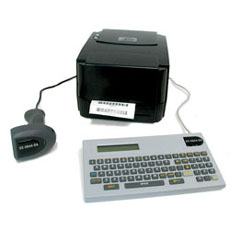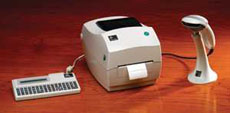The Barcode Label Duplicator: A Must-Have for Libraries
 A barcode duplicator can be very handy tool for libraries. Libraries use barcode labels on books, movies, and other items in circulation, and when these labels tear or get worn out over time, they need to be duplicated and replaced. Since libraries are often under a tight budget, creating copies of bar code labels is more convenient and time saving than having an outside source print and ship replacement labels to the library. Even if a barcode label falls off a book or DVD, for example, the bar code can be accessed through the library database and scanned to produce a new label with the aid of a barcode duplicator. Barcode duplicator systems save time and money. Because they are small and do not require connection to computers, barcode duplicators can be stored and operated near the circulation desk at a library, where it will most likely be needed. Some of the better known companies specializing in library products, such as Highsmith and Demco, carry barcode duplicators, but there are also other providers who design barcode duplicators for library use.
A barcode duplicator can be very handy tool for libraries. Libraries use barcode labels on books, movies, and other items in circulation, and when these labels tear or get worn out over time, they need to be duplicated and replaced. Since libraries are often under a tight budget, creating copies of bar code labels is more convenient and time saving than having an outside source print and ship replacement labels to the library. Even if a barcode label falls off a book or DVD, for example, the bar code can be accessed through the library database and scanned to produce a new label with the aid of a barcode duplicator. Barcode duplicator systems save time and money. Because they are small and do not require connection to computers, barcode duplicators can be stored and operated near the circulation desk at a library, where it will most likely be needed. Some of the better known companies specializing in library products, such as Highsmith and Demco, carry barcode duplicators, but there are also other providers who design barcode duplicators for library use.
Highsmith offers a barcode duplicator that can operate without the aid of a computer. Their barcode duplicator has a scanner, barcode label printer, and keyboard, and will quickly print out new labels for an existing bar code. Highsmith has been specializing in library supplies since 1956 and is located in Madison, Wisconsin.
 Demco has a barcode duplicator similar to that of Highsmith, also a stand alone unit. Key a bar code number into the system and a new barcode label is printed on a supplied thermal transfer label. This barcode duplicator includes a barcode scanner, barcode label printer, and programming that will make barcode label duplication fast and easy. Demco has been supplying libraries with products since 1905 and is based in Madison, Wisconsin.
Demco has a barcode duplicator similar to that of Highsmith, also a stand alone unit. Key a bar code number into the system and a new barcode label is printed on a supplied thermal transfer label. This barcode duplicator includes a barcode scanner, barcode label printer, and programming that will make barcode label duplication fast and easy. Demco has been supplying libraries with products since 1905 and is based in Madison, Wisconsin.
Computype has a barcode duplicator called Label Genius that is targeted towards library usage and the Code 39 bar code font commonly seen on library books. The barcode duplicator comes with a thermal transfer printer that makes little sound when printing, a CCD barcode scanner, library number replicator software, a 9-pin serial cable, and a battery pack as a backup system in the event no electricity is available. Like most barcode duplicators, this one is stand alone and does not require the use of a computer to create and print the barcode label. Label Genius can duplicate barcode labels for CDs and DVDs as well as books. Computype provides bar code solutions to medical laboratories, libraries, and the automotive industry. The company is based in St. Paul, Minnesota.
Bayscan is another company that offers barcode duplicators for libraries, among other bar code products. Bayscan has a barcode duplicator that includes a small keyboard, a barcode scanner, a printer, a thermal transfer resin ribbon, and roll of polyester labels with 1,800 per roll. Additional ribbons and label rolls can be purchased separately. Bayscan provides innovative solutions to libraries from Columbia Station, Ohio.
Photos courtesy of Highsmith and Demco.
http://www.highsmith.com/Bar-Code-Duplicating-System-c_24407596/
http://www.demco.com/goto?BLK94111&LPCM58
http://www.computype.com/en/sitecore/content/Product%20Catalog/Label-Genius.aspx
http://www.bayscan.com/products.php?cat=11&comp=22&part=152
Related articles:
Creating Code 39 Bar Codes for Library Books
How to Use Bar Codes to Catalog Your Collection
